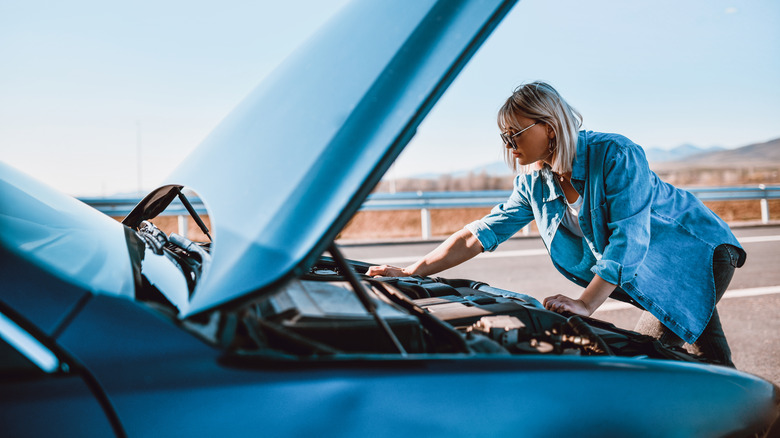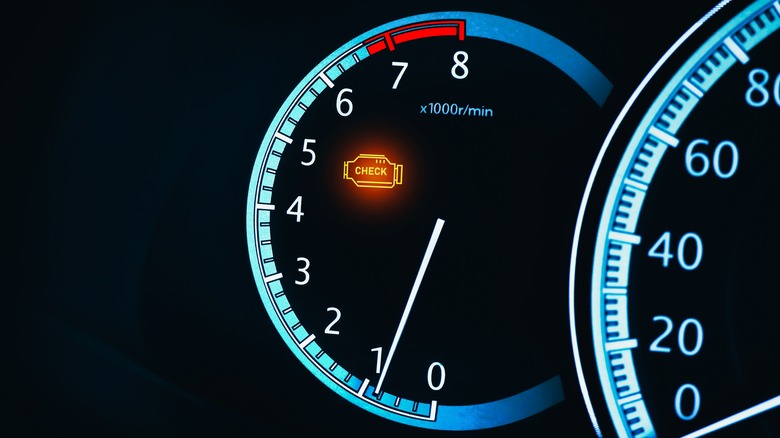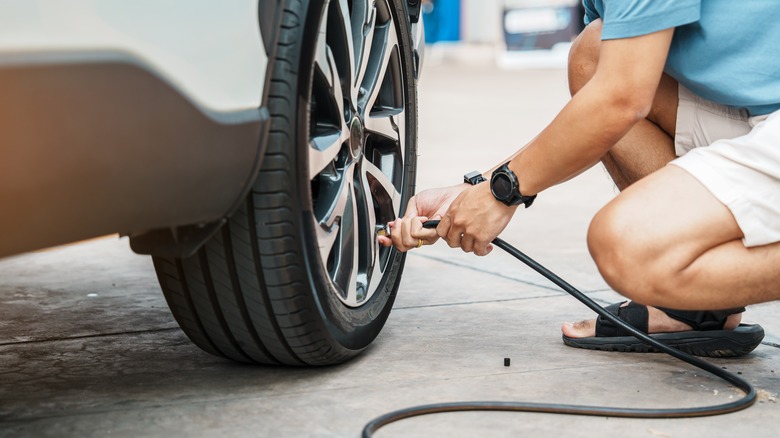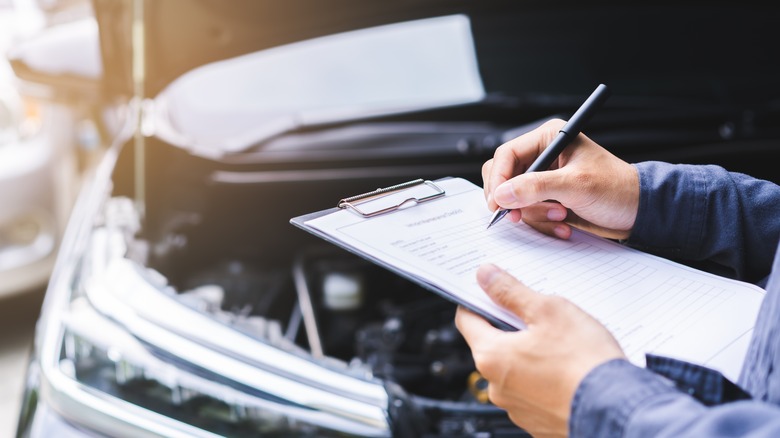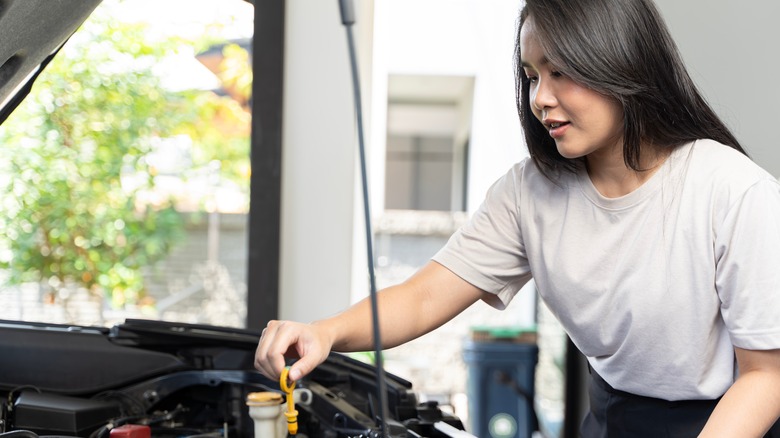5 Common Mechanical Functions Every Driver Should Know To Avoid Car Breakdowns On Road Trips
We may receive a commission on purchases made from links.
A cooler full of snacks, the perfect music playlist, and the open road — these are the characteristics of the perfect road trip. Over 75% of American adults say their 2024 summer travel plans include a road trip, which equates to more than 195 million people who will be setting out on this type of journey, per The Vacationer. These trips are sure to generate a lot of great memories, especially if you're planning to take one of the most scenic road trips in America. However, they can also provide the setting for some unexpected car maintenance issues. What are some of the most common mechanical issues that occur, and what steps can you take before your vacation to prevent any breakdowns during your trip? We conducted an exclusive interview with Anthony Calhoun, an expert automotive technician, about his suggestions for the best ways to care for your vehicle before you hit the road in order to avoid any issues on your trip.
Calhoun is a GM EV Technician and ASE Master Certified, with an ASE Service Consultant certification. He has over 15 years of experience as a technician and six years of experience managing high-volume GM dealerships. He's also the author of "Your Dealership Service Advantage: Insider Strategies for Dealership Savings." In this interview with us, Calhoun explains his recommendations for how to prepare for your next adventure on the road.
What to do if the check engine light appears
It's the first day of your road trip, and because you followed this trick, the morning of your departure has gone smoothly. After you set your playlist to shuffle and break open some snacks, the dreaded "check engine" light comes on. What does it mean, and how will it affect your travel plans? Calhoun states that this light can be an indicator of a number of different problems, which is why it often appears. "Don't let the engine part fool you either," he says. "The check engine light can be triggered from other systems like your brake system or transmission system." Because there isn't a specific light to point to a problem with the transmission system, for example, the check engine light is a general sign to check several different systems. For example, "The code that is stored in the Engine control module basically tells the technician to check in the Transmission control module," he explains.
If the check engine light does come on, then Calhoun suggests what to do next. He explains that if the vehicle has been running well before the light appears, you probably have time to drive it to a nearby shop for assistance. However, "If the light comes on and starts flashing that means the problem is likely to damage your catalytic converters or other components." If that happens, Calhoun says it's important to stop driving, especially if it's been running "rough."
What the tire pressure light could mean
Another common warning light is the tire pressure light. Calhoun explains that tire pressure sensors became mandatory in cars beginning in 2007, and the light can be a real benefit, as it alerts the driver that one or more tires are not completely inflated. The light can appear as a result of a leak or when there is a drop in the outside air temperature. "If you live in an area where it gets cold in the winter, you probably notice this light when the temperature changes," Calhoun explains. He points out that the "rule of thumb" is to expect to see tire pressure drop by 1 pound per square inch (PSI) for every 10 degrees Fahrenheit that the temperature drops.
Calhoun recommends a way to prevent the tire pressure light from being triggered by a temperature drop. "I will set the tire pressure a few pounds above [specifications] if the weather is about to change," he explains. "That saves the customer from stopping in for a tire light." He cautions that a temperature drop is not the only reason for the light to appear. "If you do not have a tire service message the light is probably just on for low tire pressure," he says. "Putting air in your tires will turn off the light." Once you've done so, it's important to observe whether the light comes on again, as it could indicate a puncture or a leak.
Why you should follow a maintenance schedule
Anthony Calhoun stresses the importance of following the required maintenance schedule to keep your car in good shape, one of the most important safety precautions you should take before a road trip. Calhoun explains, "I really cannot stress this enough because I have seen vehicles that need the engine replaced due to lack of maintenance many times." He mentions that there is a picture of a "sludged up engine" on the cover of his book, which he states is filled with essential information. "This book will help you save money, and navigate vehicle repairs giving you the ins and outs of repair facilities," he says.
Calhoun also emphasizes the importance of reading the car's manual, and he highlights the maintenance chapter as the most important section of his book. "Try and keep your vehicle from being a large liability by keeping up with the recommended maintenance," he says. Calhoun also shares what he does before setting out on a road trip himself. "When I personally take a long trip, I do the basic inspection that will come with every oil change at the dealership." He believes that doing this preventative maintenance is an important step. Preparing your car before you depart is a great way to get ready for your journey, and another way to feel safer on a long-haul road trip is to follow this additional tip.
Learn how to check your oil
While Calhoun emphasizes the importance of scheduling regular maintenance appointments for your vehicle, he also points out the value of knowing how to check the oil level yourself during a trip. He recommends doing so after you've filled your car with gas a few times. Calhoun does this regularly when he travels to ensure that his vehicle continues to run smoothly during his journey. "What most people do not know is that most owner's manuals tell you to check your oil every fill up. So usually what I do is just that, or maybe every other [fill up]," he says.
One of the reasons Calhoun suggests travelers learn to check these systems themselves is so that they won't rely too heavily on the recommendations of any car repair company. He points out that some repair facilities might recommend maintenance services that don't always match what is suggested in the owner's manual. These repair facilities are often working with chemical suppliers who suggest their own maintenance schedules in order to sell their products. "Some things are good to do a little early, just double check what they are trying to sell you and compare it with your vehicle's manufacturer owner's manual," he says. Educating yourself before your departure is a great way to ensure a safe journey, and signing up for this type of service will also make your trip less stressful.
Pack for an emergency (and bring a map)
One final suggestion that Calhoun makes is to ensure your car is equipped with several items that will be helpful in case of an emergency. For example, verify that "your vehicle is even equipped with a spare tire," because some vehicles are only supplied with Fixaflat instead, he says. Calhoun also points out, "Make sure everything you have works," such as a spare tire that is actually sound, as well as tire foam, the tools that you'll need to change a tire, and jumper cables in case your battery dies unexpectedly.
Calhoun also suggests, "All drivers should prepare for the vehicle being down for hours with them stuck in it." To prepare for this kind of scenario, Calhoun recommends that every driver stock the car with essentials that will be useful in case you're stranded on the side of the road, such as food, water, and clothing that is appropriate for the local climate in order to maintain a safe and comfortable temperature.
Another suggestion he makes might seem surprising. "One thing I am a fan of is an old school map," Calhoun says. Even though it's not associated with car repair, he still believes in the benefits of packing a physical map for your next road trip. By following these tips and preparing in advance for your journey, your adventure will be filled with less time on the side of the road and more time creating great memories.
